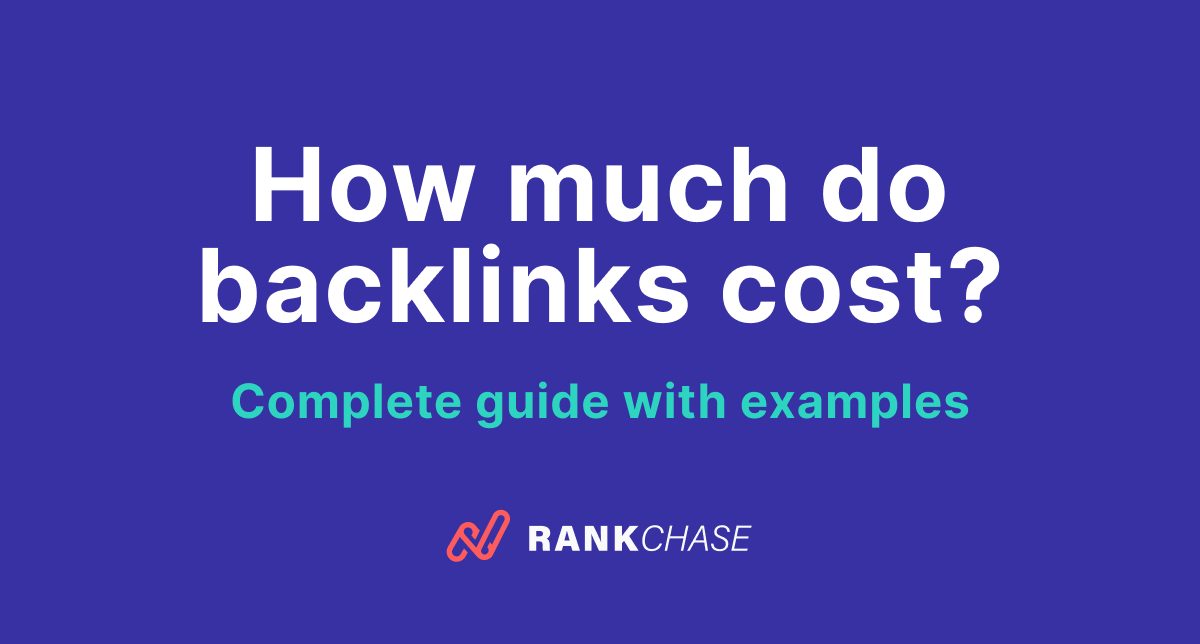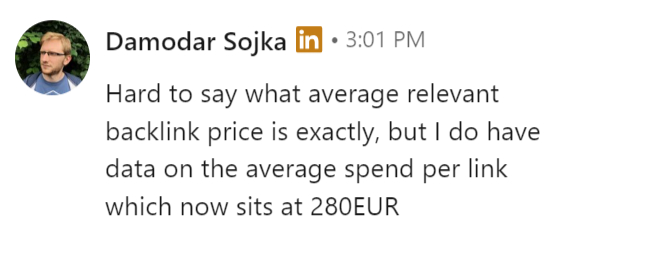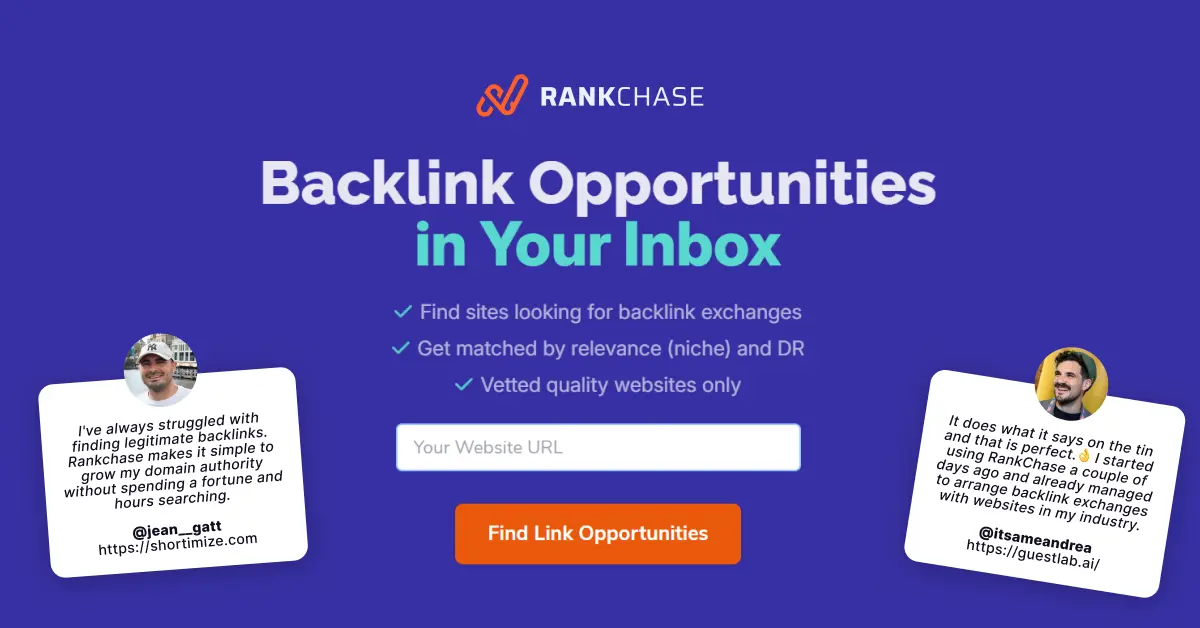How Much Do Backlinks Cost? Complete guide

If you’ve spent time with SEO, you know backlinks are essential. To drive sustainable growth and compete for top rankings, you’ll eventually need a solid link-building strategy.
But the big question is: how much do backlinks actually cost?
Like so many key questions in digital marketing, the answer is: it depends.
Backlinks don’t come with a fixed price tag. Instead, their cost is shaped by a tangle of variables like quality, relevance, industry, and a sprinkle of regional quirks. Think of it like booking a hotel room—the price per night changes based on location, season, and whether there’s a Michelin-starred restaurant downstairs.
So how do we unravel this knot? In this guide, we’ll walk step by step through the factors that influence backlink pricing, examine real-world averages, explore different types of backlinks, and dish out expert tips to get the most bang for your link-building buck.
Ready to dive in? Let’s connect the dots.
TL;DR
- Average Cost: Expect to pay between $100 and $300 for a mid-range backlink, while high-authority placements (DR70+) can exceed $1,000.
- Key Pricing Drivers: Domain Rating (DR), niche relevance, organic traffic levels, and whether you need new content created ($50-$150 extra).
- Hidden Costs: Don't forget outreach labor ($60-$90/link) and agency markups (often 30-50%).
- Risk Warning: Avoid "link farms" or bulk packages (e.g., 1,000 links for $20); these trigger Google penalties in 2026.
- Budget Alternative: Reciprocal link building via platforms like RankChase can reduce the cost per link to $2-$3.

What Makes Backlinks So Expensive (or Shockingly Cheap)?
To appreciate why backlinks range anywhere from cents to over $1,000, let’s break down the forces at play.
Backlinks aren’t commodities but more like houses in the web space. Their value depends on their "location"—or in SEO terms, metrics like Domain Authority, relevance, and organic traffic.
1. Domain Authority & Domain Rating (DA/DR)—The Status Symbol Effect
The backbone of backlink pricing rests on the authority of the website linking to you. Higher Domain Authority or Domain Rating (by tools such as Moz or Ahrefs) signals that a site is credible, established, and trusted by search engines. Backlinks from these power players don’t come cheap.
If Forbes gives you a nod, search engines perk up. That’s why links from sites with a DA/DR of 50 to 70 often command upwards of $300. And for even higher metrics expect bills of $800 or more.
2. Content Creation—Does the Link Have Context?
A backlink is only as valuable as the content it sits within. Sites that invest in well-researched, high-quality articles demand higher prices because of the work required to create them.
After all, poorly written, irrelevant content won’t help anyone—least of all your SEO strategy.
In our experience, if a site requires a new post to be published—instead of inserting your link into existing content—you can expect to pay an additional $50 to $150 per piece on top of the backlink cost.
3. Relevance—The Link Needs Purpose
A link within your niche is worth far more than an irrelevant one.
For example, if you’re in the healthcare sector, a backlink from a fitness blog or medical journal is infinitely more valuable than one from a cooking website. With this added value comes additional cost—especially in high-demand industries like law, finance, or technology, where backlinks can hit $1,000 or more apiece in highly relevant websites (>DR50).
4. Organic Traffic—The Hidden Multiplier
Many overlook the organic traffic a site receives when evaluating backlink costs, but this is a critical component.
High-traffic sites promise not just SEO wins but also exposure to real readers, making their links an SEO and marketing double-whammy.
Sites with significant organic traffic can charge a premium because their links carry that much more weight in the eyes of search engines.
For instance, on LinkBroker.io, a marketplace for purchasing backlinks, a single backlink on Forbes can run you as much as $50,000.

5. Geography Matters
Not surprisingly, regional factors can influence the cost of backlinks. U.S.-based English-speaking sites are generally pricier than those from markets with lower purchasing power. Local businesses targeting markets outside North America might benefit from these regional pricing dynamics, making cross-border campaigns a smart play.
By now, it’s probably clear: backlink costs are nuanced, influenced by a web of factors, with no one-size-fits-all answer. So, let’s step back to ask the question you’re thinking—what can you expect to pay for a backlink, on average?
The Real Numbers: What Does a Backlink Cost in 2026?
The average cost of a backlink may feel like trying to pin down the price of a cup of coffee (it’s $2 at a diner, but $7 at a boutique café with oat milk). That said, benchmark data provides some clarity:
-
General Average: Across the board, backlinks on marketplaces average roughly $300. According to Damodar, an advisor at Lemonet Backlink Marketplace, users typically pay around $280 per quality backlinks. This is a helpful mental benchmark, though remember that costs can dip as low as $50 or soar past $1,000 depending on quality, source, and industry demand.

-
Premium Backlinks: High-authority links from industry-leading publishers or reputable news outlets often cost $800 to $1,200 per link.
Authority Hacker’s research drives the point home: about 74.3% of link builders pay for backlinks, with average costs hovering at $83 for mid-range campaigns. Don’t forget, though, that averages aren’t the end-all-be-all, and if you’re handling outreach yourself, you’ll still need to invest additional time and effort.

To truly understand your costs, you’ll need to dissect the components.
The Line Items Behind Every Backlink
So, what goes into the price you’re paying? Backlinks, much like that dream smoothie you grabbed this morning, break down into several distinct ingredients:
- Outreach Labor—The Human Element
Securing backlinks is an active process. Outreach is like sales—relationship-building with website owners takes experience and time. Whether through an agency or a freelancer, you may pay $3 to $100 per hour for outreach services. If you’re paying an unusually low price for outreach, there’s a good chance your freelancer is outsourcing the link-building process to link farms (we learned this the hard way). In practice, securing just one link can command around three hours, tallying close to $60-$90 for labor alone. Keep this cost in mind if you're planning to hire a freelancer for outreach. - Content Creation—Fuel for the Link
Quality backlinks need quality content to make them stick. Producing this content—from articles to guest blogs—typically costs anywhere from $50 to $150, depending on length and depth. For lower-tier prices, you can expect cheaply made, AI-generated articles. - Direct Payment to Website Owners
This part is simple: many sites directly charge for adding a link, and these fees depend on their site metrics. A small blog might charge $100, while a DR-70 powerhouse could ask for $800 or more. - Agency Markups
When working with agencies or freelancers, you should expect markups that account for their expertise and operational costs. For example, we once hired a freelancer who was charging nearly a 40% markup on backlinks compared to the original website's pricing. We only discovered this when one of the websites reached out to us directly, offering a link placement at their original rates.
The Different Types of Backlinks—and Their Costs
There are distinct types of backlinks. And each type comes with its own price tag:
- Do-Follow vs. No-Follow Links
Do-follow links (the ones that pass SEO value to your site) come at a premium because they deliver direct ranking benefits. No-follow links, which play a subtler role, are generally cheaper. It’s unclear how Google considers No-follow links, but almost 90% of link builders agree that they still send signals to search engines and may pass some level of authority. - Guest Posts
Guest posting remains one of the most common practices for securing quality backlinks. Costs here can range from $220 to $609 depending on the site and content depth. - Paid Insertions and Niche Edits
For simpler methods, like link insertions or slight content edits to accommodate a new link, expect to pay around $100. - Premium Links (.edu or .gov Websites)
At the higher end of the spectrum are backlinks from educational (.edu) or governmental (.gov) sites. These are SEO unicorns—and they’re priced accordingly, often exceeding $1,000 due to their unparalleled authority and trustworthiness.
Wisdom from the Pros: How to Get It Right
Here’s the big secret: quality beats quantity every time. Focus on high-authority niches, use outreach wisely, and remember that paying for 1,000 spammy links will ruin your rankings in 2026.
Pro Tips to Keep Winning:
- Invest Where It Counts High-quality links, even at $800 each, have a better SEO ROI than investing in bulk, low-quality options. One solid link might outperform 50 low-value ones in SEO impact.
- Nurture Relationships Outreach campaigns are about approaching high-value sites thoughtfully. While success rates (2-5%) might sound low, strong campaigns yield outsized results for carefully vetted targets.
- Avoid Link Farms at All Costs Anything that smells spammy or too good to be true—like “1,000 backlinks for $20”—should set off alarm bells. These practices risk search engine penalties and long-term ranking damage.
How to Build Backlinks Without Breaking the Bank?
Now that you’ve learned how much backlinks can cost, you might be wondering how to scale your link-building efforts without overspending.
The reality is, if you’re a solopreneur or running a small business, paying thousands of dollars for backlinks or hiring a link-building agency just isn’t practical.
If you’re working with a tight budget and limited resources, your options for acquiring backlinks are pretty slim. Google often suggests that creating valuable content will naturally attract backlinks, but let’s be honest—that rarely happens. And producing the type of content that genuinely earns organic links, like studies or surveys, can be just as expensive as buying backlinks outright.
This leaves one practical and budget-friendly option: reciprocal link building.
How to build reciprocal links
The easiest way to streamline reciprocal link building is by using a matchmaking platform like RankChase.

The way it works is quite simply: You submit your websites and it connects you with other websites in your niche and similar DR that are also looking to exchange links and content.
Rather than spending hours on tedious outreach or paying steep fees to agencies, RankChase simplifies the process, making it easy and affordable to build high-quality links collaboratively.
How RankChase Works
- Enter your domains: Simply add your websites and let RankChase do the rest.
- Find the Right Partners: RankChase analyzes your niche, domain rating, and traffic to match you with relevant comparable websites.
- Easy Outreach: Get instant access to contact details for potential partners, saving hours of research.
Subscribing to RankChase is a $19 investment that can earn you an average of 5–10 highly relevant backlinks per month, costing as little as $2–$3 each. Since you’re contributing value by exchanging backlinks, this strategy is an excellent option for those working with a limited budget.
Wrap-Up: Backlink Investments Done Right
The backlink marketplace might feel elusive at first, but once you understand the rules, it begins to feel much clearer. Remember:
- The average backlink costs around can range between $100-300 depending on factors such as the type of backlink, the website’s metrics, and whether content creation or outreach is required.
- Focus on sites with high authority, relevant traffic, and a strong reputation for the best-quality links.
- Always prioritize quality over quantity to protect and grow your SEO rankings over the long haul.
Keep these principles in mind, and you'll be well on your way to master the art (and economics) of link building.